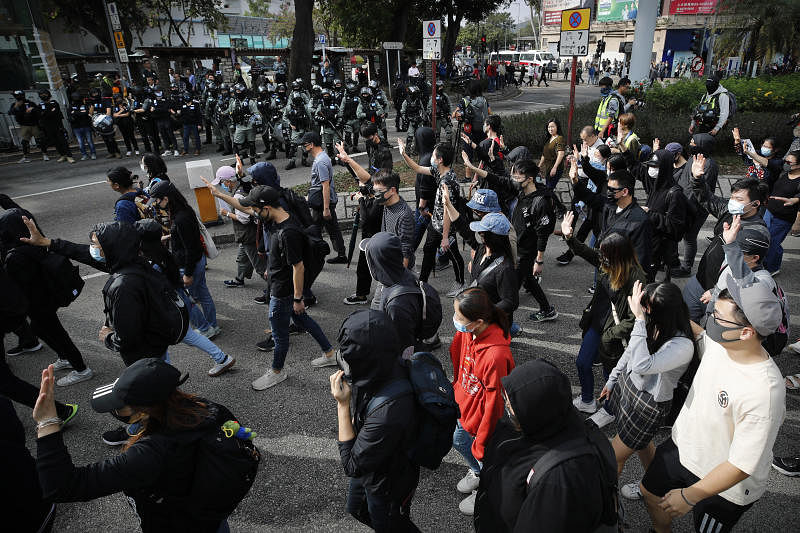Scuffles break out at Hong Kong protest taking aim at Chinese traders
Sign up now: Get ST's newsletters delivered to your inbox
Follow topic:
HONG KONG (REUTERS) - Scuffles erupted between police and protesters in Hong Kong on Sunday (Jan 5) following a march near the border, where anti-government activists shouted pro-democracy slogans and vented their anger at mainland Chinese traders.
The demonstrators in Sheung Shui took aim at so-called "parallel traders" from China who buy vast amounts of duty free goods in Hong Kong and take them back to the mainland to sell at a profit.
Locals say it pushes up prices, overcrowds neighbourhoods and adds to growing tensions between Hong Kong residents and mainland Chinese.
"The mainland Chinese come here, block the streets with their bags ... rents have gone up and it has made things more expensive for Hong Kongers," said a 19-year-old student dressed all in black, who only gave her name as Jasmin. "I want the government to know that too many of them are coming over here."
The marchers, including families with children, shouted slogans such as "Liberate Hong Kong, Revolution of our times!" and "Patriots use China-made products, don't parallel trade!"
After the march ended, protesters dressed in black and wearing face masks remained in the area despite calls from organisers to disperse immediately.
At one point, riot police stormed through, hitting protesters with batons and using pepper spray. It was unclear what triggered their intervention.
A few dozen people were arrested and seen sitting on the ground and leaning against a wall while police took down their details. Many shops in the area were closed.
Earlier in the day, in a separate incident, police fired tear gas to disperse a group of protesters hurling petrol bombs over the fence of the Sheung Shui police station before the march, damaging one police vehicle.
Sunday's protests follow a march in central Hong Kong of at least tens of thousands on New Year's Day and an escalation in clashes with the police over the festive period.
Anti-government protests in Hong Kong escalated in June over a now-withdrawn extradition Bill, but have since developed into a broader movement, with demands including universal suffrage and an independent inquiry against alleged police brutality.
Anti-government protests in Hong Kong escalated in June over a now-withdrawn extradition Bill, but have since developed into a broader movement, with demands including universal suffrage and an independent inquiry against alleged police brutality.
The police maintain that they have been reactive and restrained.

Many people in Hong Kong are angered by Beijing's tight grip on the city which was promised a high degree of autonomy under the "one China, two systems" framework when the former British colony returned to Chinese rule in 1997.
Beijing denies interference and blames the West for fomenting the unrest.
The protest movement is supported by 59 per cent of the city's residents polled in a survey conducted for Reuters by the Hong Kong Public Opinion Research Institute.
In a Saturday statement, China's Ministry of Human Resources and Social Security said the head of its Hong Kong Liaison Office, the most senior mainland political official based in the Chinese-controlled territory, had been replaced.
Mr Wang Zhimin, who had held the post since 2017, had been replaced by Mr Luo Huining, who until November was the top Communist Party official in the northern province of Shanxi.
Reuters reported exclusively in November that Beijing was considering potential replacements for Mr Wang, in a sign of dissatisfaction with the Liaison Office's handling of the crisis, the worst since the city reverted from British to Chinese rule in 1997.

